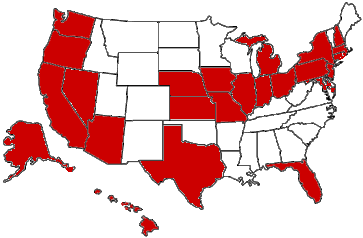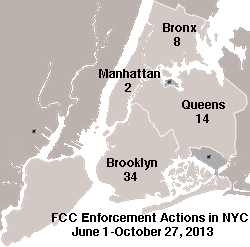When the FCC raided TOUCH FM in Boston this spring, many lamented its demise. But its frequency didn’t stay silent for long: less than two months after the FCC’s sweep of the city, a pop-up station temporarily reoccupied 106.1 FM.
Noises Over Norwell broadcast from a two-story home in Dorchester currently under the receivership of Fannie Mae. Its former owners moved back in with the assistance of City Life/Vida Urbana, a grassroots organization dedicated to fighting economic injustice in Boston. The station was a cornucopia of information, discussion, and creativity about the state of the economy and the surrounding neighborhood; when "dormant," you simply heard the ambient sounds of a lived-in home. Continue reading “Pop-Up Station Pays Homage to TOUCH FM”
Category: Pirate Radio
Boston Media Lament Loss of Pirates
On those rare occasions when the FCC and Federal Marshals sweep a city for pirates, the media coverage follows a predictable narrative: law-and-order cleaning up the airwaves, in the protection of "public safety" and licensed-station profitability. The only outliers to this have been reactions to pirate-busts in San Francisco and Santa Cruz—two California communities with a long history of radical radio activism.
But Boston-area media outlets also broke the traditional mold in their coverage of an April sweep that netted three pirate stations. Continue reading “Boston Media Lament Loss of Pirates”
Early-Internet Pirate Radio Sites Resurrected
Those of us who predate the Internet remember GeoCities with some fondness. It was one of the first portals on the World Wide Web to allow you to build your own web page. The business model was pretty simple: give folks some space and rudimentary tools to put content online and sell ads around it.
Launched in 1994, GeoCities became a vibrant space where people shared their passions and knowledge; this is how we did it before there were blogs and social networks. By 1999, it was the third most popular destination online, and Yahoo! scarfed it up during the first dot-com bubble for a whopping $3.6 billion. Ultimately, blogs and social networks eclipsed GeoCities, and its plug was pulled (everywhere but Japan) in 2009. Continue reading “Early-Internet Pirate Radio Sites Resurrected”
Pirate Raids Offer Glimpse Into FCC Fieldwork
It’s been a busy month for FCC field agents and Federal Marshals in the Northeast. Last week they raided and seized the equipment of three unlicensed radio stations in the Boston area, while two weeks prior they took down four pirate stations in New York City.
The Boston raids netted a long-time pirate who operated way out in the open. TOUCH FM, founded by long-time and well-respected community activist Charles Clemons, had been on the air for eight years. Clemons was also quite engaged in the movement to expand low-power FM radio and even ran for mayor of Boston last year. He’s been on the FCC’s radar since 2007, when he was first visited and warned; the agency followed up with a $17,000 fine in 2008, which was never paid. Continue reading “Pirate Raids Offer Glimpse Into FCC Fieldwork”
FCC Enforcement in 2013: No Great Crusade
The federales ended their unlicensed broadcast enforcement activity with a whimper last year, apparently taking the month of December off completely. The entirety of 2013 saw 249 FCC enforcement actions, a slight reduction from 2012 levels.
 Overall, the FCC was active against pirate stations in 24 states and the District of Columbia, and more than 90% of those stations involved were on the FM band. The vast majority of enforcement activity was concentrated on the coasts, with New York and New Jersey being the hottest spots for pirates—as evidenced by the major sweep the FCC did there in July. (For what it’s worth, there’s been no material change in the number of FM frequencies occupied by interlopers on my own radio dial here in Brooklyn.) Continue reading “FCC Enforcement in 2013: No Great Crusade”
Overall, the FCC was active against pirate stations in 24 states and the District of Columbia, and more than 90% of those stations involved were on the FM band. The vast majority of enforcement activity was concentrated on the coasts, with New York and New Jersey being the hottest spots for pirates—as evidenced by the major sweep the FCC did there in July. (For what it’s worth, there’s been no material change in the number of FM frequencies occupied by interlopers on my own radio dial here in Brooklyn.) Continue reading “FCC Enforcement in 2013: No Great Crusade”
Free Radio Network (not quite) Resurrected
Recently stumbled across thefrn.net—a bare-bones bulletin board where just a handful of the shortwave pirate enthusiasts that frequented the original Free Radio Network have re-congregated.
The story isn’t completely clear, but it appears that the FRN’s founders have given up the ghost, shutting down their server permanently. According to shortwave pirate-watcher extraordinaire Ragnar Daneskjold, "Unfortunately it looks like we lost the huge database of old logs, posts and information. That was a huge wealth of knowledge and history." Indeed it was…and simply shameful if true. Continue reading “Free Radio Network (not quite) Resurrected”
FCC Develops its own Enforcement Action Database
It’s been a busy year for the Federal Communications Commission: leadership changes, shutdowns and sequesters, and increased pressure from Congress and its core industry-constituents to "modernize" itself.
A goodly portion of the latter is happening on the agency’s web site. With little fanfare earlier this year, the FCC rolled out a "Maps" section which visualizes various aspects of agency business, including FCC Enforcement Actions Against Pirate Radio By Location. Continue reading “FCC Develops its own Enforcement Action Database”
FCC Anti-Pirate Efforts Focus on NYC
It was a pretty busy summer for the federales, who not only managed to roll out their own version of the Enforcement Action Database, but made moves against pirate radio broadcasters in nine states. Among them, New York saw the vast majority of this action.
 Of the 80+ recently-logged enforcement actions (which brings the yearly total to 200), nearly three-quarters of those happened in four of the five boroughs of New York City.
Of the 80+ recently-logged enforcement actions (which brings the yearly total to 200), nearly three-quarters of those happened in four of the five boroughs of New York City.
In the month of July alone, FCC agents visited and sent warning letters to more than two dozen pirates in the city; one unlucky station op in Queens got two visits and warning letters within this time span. Continue reading “FCC Anti-Pirate Efforts Focus on NYC”
Pirate Broadcasting in the Digital Age
In many parts of the world, radio is slowly transitioning to a digital transmission platform—but so far, this new frontier has not been plumbed by pirates. Part of this is due to the relatively immature state of radio’s digital transition, but some of the systems have been around long enough that they’re ripe for experimentation.
In very simple terms, the primary thing to keep in mind is that the heart of a digital radio transmission system is the software that controls the transmitter. The more freely-available the software, the more possible to play with. In global contention, there are three contending platforms of note, though their DIY-potential varies: Continue reading “Pirate Broadcasting in the Digital Age”
The Free Radio Network: 1993-2013?
It’s been quite a ride for the Free Radio Network, an historic online hot-spot for discussion of pirate radio in the United States. The FRN was launched in 1993 as a dial-up bulletin board system (BBS) administered by shortwave pirate enthusiasts John Cruzan and Kirk Trummel.
After transitioning to the Internet, the FRN expanded far beyond its message boards, though those remained a primary draw. In the early days of the World Wide Web, The Free Radio Network was one of the few places online where pirate broadcasters and allies could have frank discussions about their activity and its implications. It’s also been a primary collection-point for reception reports involving shortwave pirate stations. Continue reading “The Free Radio Network: 1993-2013?”